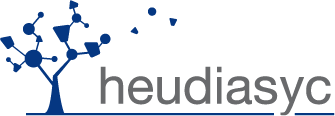Sidebar
Cooperative localization of map-assisted autonomous vehicles with integrity study
The autonomous driving requires to be able to localize ourselves as precisely as possible in the environment. To do so, the data from multiple sensors are fused to estimate a pose with a precision adapted to the navigation task. This precision is even more important in a urban environment as there are importants safety issues that depend on it: staying on a narrow pavement, stoping at an intersection (stop sign, traffic light, …), distinguish a pedestrian on the sidewalk or on the road, … GNSS (Global Navigation Satellite Systems), one of the main absolute localization sources, are much less effective in an urban environment. Indeed, the high buildings generate multipath and NLOS (Non-line of sigh), disrupting the localization.
A goal of this thesis is to produce another absolute localization source, which would be fused with GNSS measurements, to improve the localization in urban areas. The buildings that disrupt the GNSS will be used to localize the vehicle. The idea is to detect, with a 3D lidar, the buildings to associate them with a map of the environment. Cooperative localization between vehicle, with indirect measurements, will also be studied to improve the localization and to keep the map up-to-date. The update of the map will also take place with the multiple passages and the share with others vehicles.




